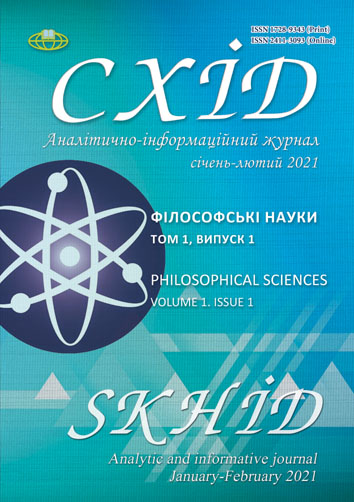PHILOSOPHICAL AND ETHICAL CONTROVERSIES OF CONTRACTUALISM
DOI:
https://doi.org/10.21847/1728-9343.2021.1(1).225763Keywords:
ethical discourse, J. Rawls’s theory of justice, moral bases of a state, “involvement of the Other” of J. HabermasAbstract
Philosophical and ethical controversies of contractualism are analyzed in the article. Revitalization of modern ethical discourse based on social agreement connected with J. Rawls whose “theory of justice” is interpreted in the light of philosophical and legal legitimization of socio-democratic practices of “a state of general prosperity”. Criticism of this theory presented in the works of R. Nozick and R. Dworkin is highlighted. Where the first one rejects morality of state redistribution of “justly” acquired property, the second considers moral bases of socio-regulated governed influence based on “natural law” argumentation. The analysis of discrepancies between the approaches of J. Rawls and R. Dworkin has demonstrated the difficulties of neo-liberal attempts to prove moral bases of a modern state: problem statement in the individualistic way doesn’t consider dynamic character of human socialization and neglects an issue regarding a moral status of marginalized populations. Criticism of neo-liberal controversies of contractualism performed by J. Habermas, is analyzed. Communicative approach to dichotomy withdrawal of liberal freedom (“rights of the new”) and ideas of public autonomy (“rights of the old”) is revealed. The study concludes that Habermas’s “involvement of the Other” is to meet all practical challenges of the modern society, it evokes a consideration of the main approach of moral bases definition of a legal, democratic and social state. Ethical discourse content is proved to be an embodiment of a process of self-awareness created by civil society that is a special form of existence and development of social subjectivity.
Downloads
References
Alekseeva, T.A. (1992). Spravedlivost. Moralno-politicheskaya filosofiya Johna Rawlsa. Moscow: Nauka, 112 p. (In Rus-sian)
Bell, D. (1999). Griadushcheye postindustrialnoye obshchestvo. Opyt sotsialnogo prognozirovaniya (Translat. from Engl.). Moscow: Academia, 956 p. (In Russian)
Boucher, D., Kelly, P. (1994). The social contract and its critics: an overview. In: Boucher, David and Kelly, P. J. eds. The Social Contract From Hobbes to Rawls, London: Routledge, 1-34.
Dworkin, R. (2000). Spravedlyvist i prava. In: Seryoznyy pohlyad na prava (Translat. from Engl.). Kyiv: Osnovy: S.220–263 (In Ukrainian).
Gough, J.W. (1978). The social contract: a critical study of its development. Westport, Conn.: Greenwood Press, 1978. 259 p.
Habermas, J. (1994). Primireniye cherez publichnoye upotrebleniye razuma. Zamechaniya o politicheskom liberalizme Johna Rawlsa. Voprosy filosofii, 10: 53-67 (In Russian).
Habermas, J. (2001). Vovlecheniye drugogo. Ocherki politicheskoy teorii (Translat. from Germ.) St.Petersburg: Nauka, 417 p. (In Russian)
Kant, I. (1999). O pogovorke “Mozhet byt”, eto i verno v teorii, no ne goditsya dlya praktiki”. In: I. Kant. Osnovy metafiziki nravstvennosti (translat.). Moscow: Mysl: 515–562 (In Rus-sian).
Martin, R. (1994). Economic justice: contractarianism and Rawls’s difference principle. In: David Boucher (ed.) and Paul Kelly (ed.) The social contract from Hobbes to Rawls. London; New York: Routledge: 245–266.
Nozick, R. (1974). Anarchy, state and utopia. N. Y.: Basic Books,– XVI, 367 p.
Nozick, R.(1998). Rozpodilna spravedlyvist. In: Suchasna politychna filosofiya: Antolohiya (translat from Engl.) Kyiv: Osnovy: 239–276. (In Ukrainian)
Ostrom, E. (2005). Understanding institutional diversity. Prince-ton: Princeton University Press.
Rawls, J. (2002). The law of peoples with “The Idea of Public Reason Revisited”. Cambridge; London: Harvard University Press, 199 p.
Rawls, John (2000). Politychnyy liberalizm (Translat. from Engl.). Kyiv: Vydavnytstvo Solomiyi Pavlychko “Osnovy”, 382 p. (In Ukrainian)
Rawls, John (2001). Teoriya spravedlyvosti. (Translat. from Engl.). Kyiv: Vydavnytstvo Solomiyi Pavlychko “Osnovy”, 822 p. (In Ukrainian)
Scott, James C. (1998). Seeing like a State. How certain schemes to improve the human condition have failed. Yale: Yale University Press, New Haven and London.
Soros, G. (2000). Open society: Reforming global capitalism. New York: PublicAffairs.
Yermolenko, A.M. (1999). Komunikatyvna praktychna filosofiya. Kyiv: Libra, 488 p. (In Ukrainian)
Downloads
Published
How to Cite
Issue
Section
License
Copyright (c) 2021 Taras Butchenko, Ingrida Unikaite-Jakuntaviciene

This work is licensed under a Creative Commons Attribution-NonCommercial-NoDerivatives 4.0 International License.
1. Authors bear responsibility for the accuracy of facts, quotations, numbers and names used.
2. Manuscripts are not sent back.
3. The publisher does not always agree with the authors' opinion.
4. The authors reserve the right to authorship of the work and pass the first publication right of this work to the journal under the terms of a Creative Commons Attribution-NonCommercial-NoDerivatives 4.0 International License. This license allows others to distribute (copy) the published work for non-commercial purposes, provided there is mandatory attribution to its authors and a link to the first publication in our journal.
5. The authors have the right to conclude separate supplement agreements that relate to non-exclusive work distribution in the form in which it has been published by the journal (for example, to upload the work to the online storage of the journal or publish it as part of a monograph), provided that the reference to the first publication of the work in this journal is included.

